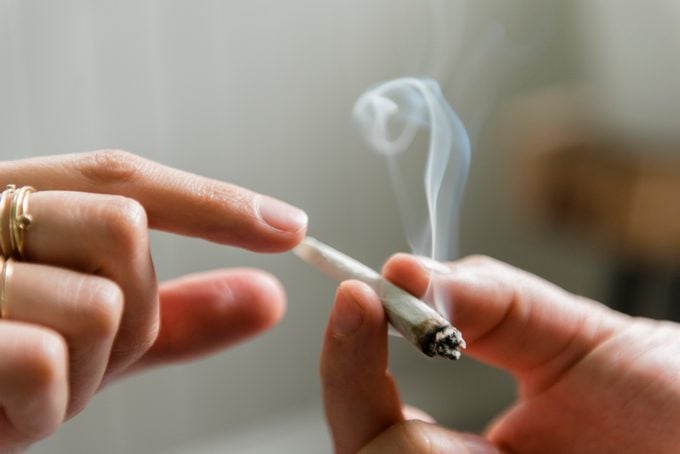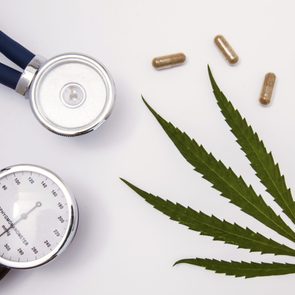6 Reasons Smoking Weed With Asthma Is a Bad Idea
Updated: Jun. 14, 2021
One in five people with asthma use marijuana, but smoking weed can cause permanent lung damage and might make your asthma worse.
Clearing the air
Have you heard that vaping or smoking marijuana is good for asthma, supposedly helping to relax airways, slow breathing, and reduce asthma attacks? It’s a popular myth—and a potentially dangerous one.
“This just isn’t true, and standard asthma therapies are much more effective treatments than marijuana in any form,” says pulmonologist Anthony Gerber, MD, a professor of pulmonary, critical care, and sleep medicine at National Jewish Health.
“As a lung doctor, I want to remind people that the healthiest option is always to not inhale anything other than air, whether you have asthma or not,” says Dr. Gerber.
Of course, there are many reasons why people use marijuana aside from medicinal purposes, including fun and relaxation.
Asthma is one of the most common chronic conditions in the United States, and with recreational marijuana being legal for adults in 16 states and Washington, D.C., there are plenty of people with asthma who also happen to enjoy smoking marijuana (cannabis).
A survey of 489 adults, conducted by the Allergy & Asthma Network and published in the Annals of Allergy, Asthma, and Immunology, found that nearly one in five people with asthma said they use cannabis.
Of those who said they use it in some form, over half said they smoke it. The majority of participants were female and Caucasian.
If you have asthma, here’s what you need to know before you consider using cannabis.

How marijuana affects asthma
“Overall, smoking pot is not a good idea for someone with asthma, as it can cause excess inflammation in your lungs and is a known trigger for asthma attacks,” says Purvi Parikh, MD, an allergist with the Allergy & Asthma Network.
It’s an allergen
Pollen is one of the most common environmental allergens, and cannabis is a pollen-bearing plant.
This makes it a common yet surprisingly unknown trigger of allergic asthma, according to a 2015 study published in the Annals of Allergy, Asthma and Immunology. Incidences of allergic reactions, hypersensitivity, and even anaphylaxis were reported.
It may also increase your sensitivity to other types of pollen, making your allergic asthma worse.
It can damage the blood vessels in your lungs
Inhaling marijuana smoke, even secondhand, may damage the capillaries, the thinnest and smallest type of blood vessels, which supply oxygen to tissues throughout the body, including the lungs.
Rats who inhaled secondhand marijuana smoke for just one minute experienced significant constriction in their capillaries, according to a 2016 study published in the Journal of the American Heart Association.
It took the rats’ blood vessels longer to recover after each exposure. Over time, this could lead to permanent damage—and that’s just from secondhand smoke.
In humans with asthma, smoking weed could cause similar constriction and damage, triggering an attack and/or making an attack more severe.
It can weaken your immune system
Certain immune cells found in your lungs are critical to keeping your lungs healthy by fighting off bacteria and viruses.
Smoking marijuana dampened the effect of these immune cells, according to a 2016 study published in Frontiers in Pharmacology. This may make pot smokers more vulnerable to infections.
People with asthma are already more likely to get respiratory illnesses, experience more severe symptoms, and take longer to recover.
It can make your asthma harder to control
People with asthma who used pot were more likely to need treatment at a hospital and more likely to need intensive care in the hospital, according to a study published in Respirology.
The researchers looked at admissions records from more than 400 patients with asthma and theorized that people who use marijuana are also less likely to stick to their asthma treatment plan, allowing their condition to get out of control.
It may affect medical treatment
Marijuana is one of the substances you need to tell your doctors about, particularly if you may need surgery.
Cannabis products affect the central nervous system and can interfere with the effectiveness of some medications that work on that system, including anesthesia.
It does not make it easier to breathe
Contrary to the myth, smoking or vaping pot does not relax the airways. That’s what a 2018 study, published in Annals of the American Thoracic Society, found.
People with chronic obstructive pulmonary disease—an illness that is different from asthma but also reduces lung function—showed no improvement in breathlessness after inhaling marijuana.
Vaping, smoking, and edibles
“It’s a myth that vaping is safer for your lungs than smoking,” says Dr. Gerber, who is also an associate professor of medicine at the University of Colorado Denver.
Both methods of inhaling marijuana come with chemical and physical risks.
“Vaping—pot or tobacco—damages your lungs irreversibly,” says Dr. Parikh, who is also a clinical assistant professor in the departments of medicine and pediatrics at New York University School of Medicine.
Edibles may seem like a more sensible choice because they bypass the lungs. However, some of the harmful effects of cannabis, like allergy triggers, stem from the components of marijuana itself. This may mean that using pot in any form could worsen your asthma and cause long-lasting harm.
Smoking weed vs. a cigarette
Many people think marijuana is “healthier” than tobacco and that if you’re going to smoke something, pot is the lesser of two evils.
There is some truth to this, Dr. Gerber says.
“Pot has fewer inhalants in it than tobacco,” he says, adding that people tend to only take a few puffs off a blunt rather than chain smoke like tobacco users may do with cigarettes. This can lead to less product being inhaled over time.
On a cellular level, however, marijuana smoke may actually be more harmful than tobacco smoke.
In the Journal of the American Heart Association study, the rats’ blood vessels took at least three times longer to recover function after only a minute of breathing secondhand marijuana smoke, compared with recovery after a minute of breathing secondhand tobacco smoke.
In addition, the researchers noted in the Frontiers in Pharmacology study that cannabis smoking caused harmful effects on lung function and inflammation that tobacco smoking did not.
Treat the real issues
All of our experts agree that if you have asthma, particularly if it’s severe or uncontrolled, then you should avoid smoking pot or using marijuana in any form.
If you’re considering smoking marijuana to help with a medical condition, like asthma or anxiety (which can trigger asthma attacks), you should instead get proper treatment for that condition specifically, Dr. Gerber says.
That may mean changing to a daily or different asthma medication and getting therapy and/or medication to control anxiety.
The bottom line is that no one wants lung damage, but because asthma already causes lung damage, people with asthma need to be even more careful with what they put in their lungs.




















